广东中考英语完形填空解题技巧及专项训练
2022-2024年广东中考英语复习各题型应对方法

1.语法选择思路——以八上unit2核心素养为例一、做题思路:(一)整体思路:语法选择,语法为主,内容为辅。
(二)具体思路:1.先看选项,判断考点,唤醒反射区。
2.看题干空格前后,判断时态、搭配、成分等。
二、具体实操(反射区)完形填空做题思路——以2023年广东中考为例一、做题思路(一)整体思路:跟着文章给出的线索和提示走,提示与答案一一对应(二)具体思路1.快速略读文章,重点抓主题句,理解文章的发展脉络,体会情感态度(积极的或者悲伤的)2.首先,看四个选项,理解四个选项意思。
其次,再看题干。
大多数情况下,对应的选项一定会有足够的提示(即线索)支撑。
3.最后,选择正确答案,代入文章,看是否与线索对应,符合逻辑。
(三)难点处理思路1.长难句处理思路找出主谓宾,剔除状语,对句子有整体上理解。
二、具体实操(找线索)(一)略读文章,看主题句。
由①Little Dora always wanted a sister. ②"How can I make go faster? ③By the time she saw red apples on the tree, she would have a sister! ④"Now you have a sister and a brother!"这几个文章脉络可以知道,文章整体的感情基调是整体积极向上的。
其大致意思是,主人公想要一个妹妹,他想让时间变快,他得看到树上的红苹果,最后他迎来了他弟弟妹妹。
(二)看选项,找线索,代入文章。
41.①看四个选项的意思分别是:富有的,害怕的,紧张的,开心的。
(后面题目不再解释,自行理解即可)②题干中,她感到。
由线索“wanted a sister”和结局的“Dora said happily. ”可知,她应该是cheerful。
③代入选项,他妈妈和他说他讲有一个妹妹,这使他感到开心。
42.①看四个选项意思。
广东中考英语完形填空题型解题指导及练习
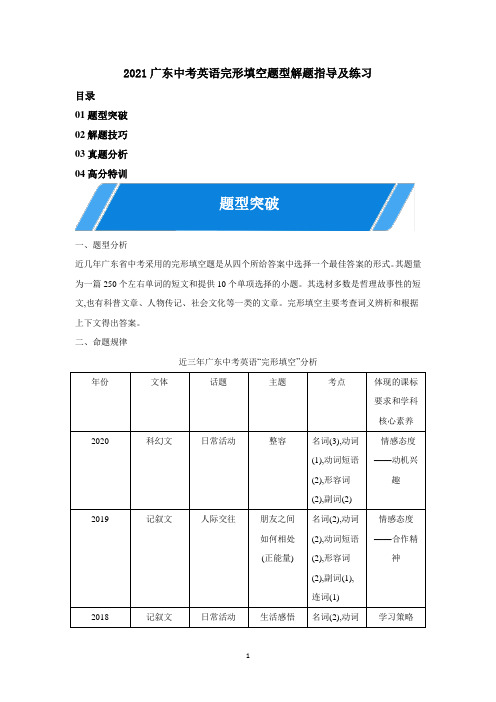
2021广东中考英语完形填空题型解题指导及练习目录01题型突破02解题技巧03真题分析04高分特训一、题型分析近几年广东省中考采用的完形填空题是从四个所给答案中选择一个最佳答案的形式。
其题量为一篇250个左右单词的短文和提供10个单项选择的小题。
其选材多数是哲理故事性的短文,也有科普文章、人物传记、社会文化等一类的文章。
完形填空主要考查词义辨析和根据上下文得出答案。
二、命题规律近三年广东中考英语“完形填空”分析年份文体话题主题考点体现的课标要求和学科核心素养2020 科幻文日常活动整容名词(3),动词(1),动词短语(2),形容词(2),副词(2)情感态度——动机兴趣2019 记叙文人际交往朋友之间如何相处(正能量) 名词(2),动词(2),动词短语(2),形容词(2),副词(1),连词(1)情感态度——合作精神2018 记叙文日常活动生活感悟名词(2),动词学习策略三、备考建议完形填空的考查主要以动词(1~2个)、动词短语(1~2个)、名词(2~3个)、形容词(1~2个)和副词(1~2个)的辨析为主。
备考中建议多反思做题方法:通读全文、瞻前顾后、联系上下文以及关注事件的起因、经过和结果。
同时,考生在平时的练习中要注意积累常见的词汇和固定搭配,重视篇章内在的逻辑关系和文章脉络。
附:广东省中考英语完形填空选项高频词(近5年总结归纳)四、真题易错点分析易错点1(2020年广东省卷节选)Several months ago, Mr.Smith went to a body engineering shop and 42 a small nose.Small noses were very 43.popular these years.42. A.cared for B.waited forC.asked forD.sent for点拨:答案选C。
考查动词词组辨析和对上下文语境的理解。
本题易错选D选项。
2020广东省中考——英语短文填空解题方法和技巧讲解 (附练习试题)(有答案)
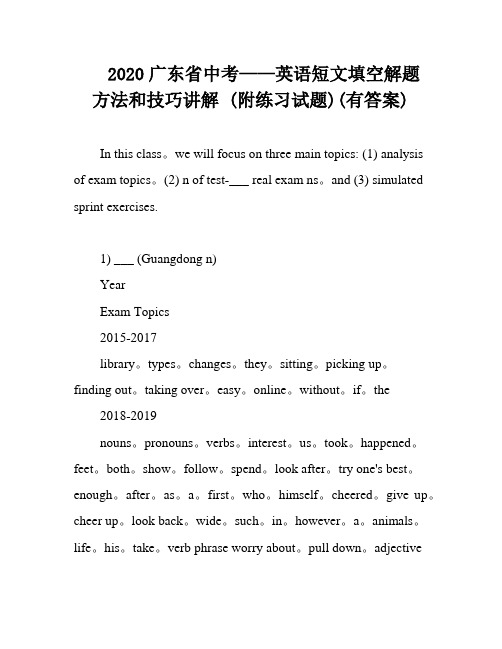
2020广东省中考——英语短文填空解题方法和技巧讲解 (附练习试题)(有答案)In this class。
we will focus on three main topics: (1) analysis of exam topics。
(2) n of test-___ real exam ns。
and (3) simulated sprint exercises.1) ___ (Guangdong n)YearExam Topics2015-2017library。
types。
changes。
they。
sitting。
picking up。
finding out。
taking over。
easy。
online。
without。
if。
the 2018-2019nouns。
pronouns。
verbs。
interest。
us。
took。
happened。
feet。
both。
show。
follow。
spend。
look after。
try one's best。
enough。
after。
as。
a。
first。
who。
himself。
cheered。
give up。
cheer up。
look back。
wide。
such。
in。
however。
a。
animals。
life。
his。
take。
verb phrase worry about。
pull down。
adjectivetired。
adverb later。
n (phrase) with。
ns although and and。
article a.2) ___ Real Exam ns (Guangdong n。
2019)We will analyze the 2019 ___ and tricks for test-taking。
3) Simulated Sprint ExercisesWe will ___.1.___ I spent a day there。
第3讲 完形填空 - 2024年广东中考英语必考题型串讲

A.dreams
B.problems
C.discoveries
D.advantages
一看选项。A 选项,dreams 梦想;B 选项,problems 问题; C 选项,discoveries 发现;D 选项,advantages 优势。
二分析语境。根据空格后列举的几条信息,综合可知,此处 表达的是男孩自己的优势,排除 A、B、C 选项。故选 D。
动词(短语) 45,46,48,49 42,44,46,47 41,47,48,49
一、解题技巧
1.根据语境推断 根据上下文的语境提示或暗示,体验语境和作者的情感态度, 推断出符合文章场景的最佳选项。
2.利用词汇复现 词汇复现是指文章中的某一词以原词、同义词、近义词、反 义词、概括词或其他形式重复出现在设空前后,句子通过词汇的 复现达到了相互衔接。这种复现形式有助于我们理解文章内容并 答题。
3.遵循逻辑推理 各句子、段落之间有着逻辑上的联系,我们可以通过对故事 的线索、文章前后内容之间的逻辑关系以及人物情感的发展来分 析和理解文章,以此推断出正确答案。中考中常见的逻辑关系主 要有并列、转折、让步、因果、条件、递进等。
4.常用固定搭配 这类题常考查动词与介词的搭配,考生可以根据语境选择合 适的固定短语或词组。
例 2 (2021 年广东省)
...What are Sam's ______? For one, he wrote, “My sister says I act like an alien (外星人).” Sam also said he had watched almost all
the space movies he could find.His last sentence may touch people's hearts: “I am young, so I can learn to think like an alien.”
中考英语完形填空解题技巧及例题解析
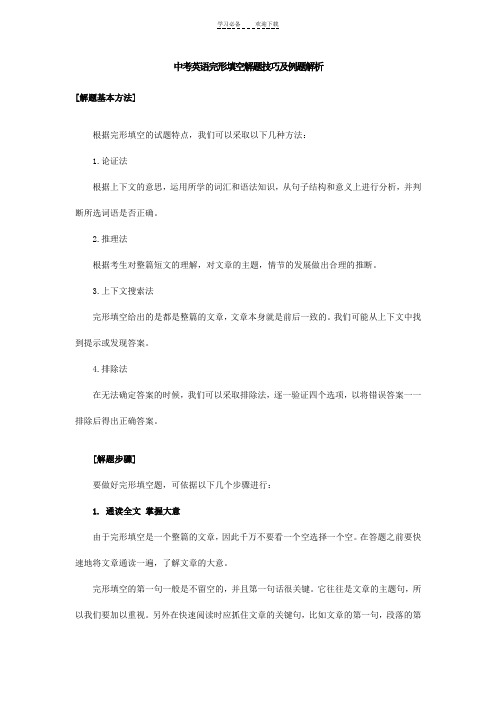
中考英语完形填空解题技巧及例题解析[解题基本方法]根据完形填空的试题特点,我们可以采取以下几种方法:1.论证法根据上下文的意思,运用所学的词汇和语法知识,从句子结构和意义上进行分析,并判断所选词语是否正确。
2.推理法根据考生对整篇短文的理解,对文章的主题,情节的发展做出合理的推断。
3.上下文搜索法完形填空给出的是都是整篇的文章,文章本身就是前后一致的。
我们可能从上下文中找到提示或发现答案。
4.排除法在无法确定答案的时候,我们可以采取排除法,逐一验证四个选项,以将错误答案一一排除后得出正确答案。
[解题步骤]要做好完形填空题,可依据以下几个步骤进行:1. 通读全文掌握大意由于完形填空是一个整篇的文章,因此千万不要看一个空选择一个空。
在答题之前要快速地将文章通读一遍,了解文章的大意。
完形填空的第一句一般是不留空的,并且第一句话很关键。
它往往是文章的主题句,所以我们要加以重视。
另外在快速阅读时应抓住文章的关键句,比如文章的第一句,段落的第一句和最后一句等。
它们往往是全文或全段的主题句,通过它们可以知道文章的题材,大意,时间,人物,事件等。
比如20XX年福建省福州市中考题中的完形填空的第一句话是:Mr Green was ill and went to the hospital. 通过这句话我们可知这是一篇记叙文,主人公是Mr Green ,主要内容是到医院看病。
另外在阅读中要对其中的时间词,动词要加以注意。
2. 精读试填依据文章的主干,运用所学的词汇和语法知识,根据上下文的关系,加上初读的印象和正确的英语语感,运用前面介绍的解题方法,将答案初步确定。
这是解题的重要步骤,要细心分析,严密论证。
在解题过程中,不少考生答题时只看有空白的部分,这种离开上下文,单独地看一个句子,答案可能是正确的,但结合整篇文章来看,内容确是错误的。
因此就要求考生要前后兼顾,上下统筹。
最终才能得出正确答案。
我们以20XX年安徽省中考完形填空题为例,其中有这样一句话:The Thais (44)_______ to eat with their hands and now there are still some people who eat this way…A. wentB. hadC. wantedD. used这句话如果只看空格,四个选项分别是短语: go to do…, have to do …, want to do…, used to do…, 但结合后半句and now there are still some people who eat this way, 可知答案应该是D。
广州中考完形填空和阅读理解技巧讲解及练习
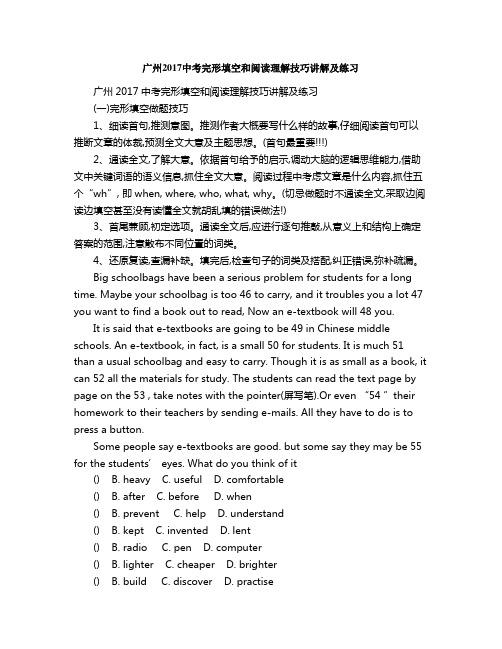
广州2017中考完形填空和阅读理解技巧讲解及练习广州2017中考完形填空和阅读理解技巧讲解及练习(一)完形填空做题技巧1、细读首句,推测意图。
推测作者大概要写什么样的故事,仔细阅读首句可以推断文章的体裁,预测全文大意及主题思想。
(首句最重要!!!)2、通读全文,了解大意。
依据首句给予的启示,调动大脑的逻辑思维能力,借助文中关键词语的语义信息,抓住全文大意。
阅读过程中考虑文章是什么内容,抓住五个“wh”, 即when, where, who, what, why。
(切忌做题时不通读全文,采取边阅读边填空甚至没有读懂全文就胡乱填的错误做法!)3、首尾兼顾,初定选项。
通读全文后,应进行逐句推敲,从意义上和结构上确定答案的范围,注意散布不同位置的词类。
4、还原复读,查漏补缺。
填完后,检查句子的词类及搭配,纠正错误,弥补疏漏。
Big schoolbags have been a serious problem for students for a long time. Maybe your schoolbag is too 46 to carry, and it troubles you a lot 47 you want to find a book out to read, Now an e-textbook will 48 you.It is said that e-textbooks are going to be 49 in Chinese middle schools. An e-textbook, in fact, is a small 50 for students. It is much 51 than a usual schoolbag and easy to carry. Though it is as small as a book, it can 52 all the materials for study. The students can read the text page by page on the 53 , take notes with the pointer(屏写笔).Or even “54 ”their homework to their teachers by sending e-mails. All they have to do is to press a button.Some people say e-textbooks are good. but some say they may be 55 for the students’ eyes. What do you think of it() B. heavy C. useful D. comfortable() B. after C. before D. when() B. prevent C. help D. understand() B. kept C. invented D. lent() B. radio C. pen D. computer() B. lighter C. cheaper D. brighter() B. build C. discover D. practise() B. desk C. screen D. card() out B. hand in C. get back D. give back() B. famous C. good D. bad(二)阅读理解做题技巧考纲中指出,阅读理解主要考查学生对于不同体裁或不同题材语言材料的理解能力,以及通过材料的阅读,对材料中信息的捕获能力。
2020广东省中考——英语短文填空解题方法和技巧讲解 (附练习题)(有答案)
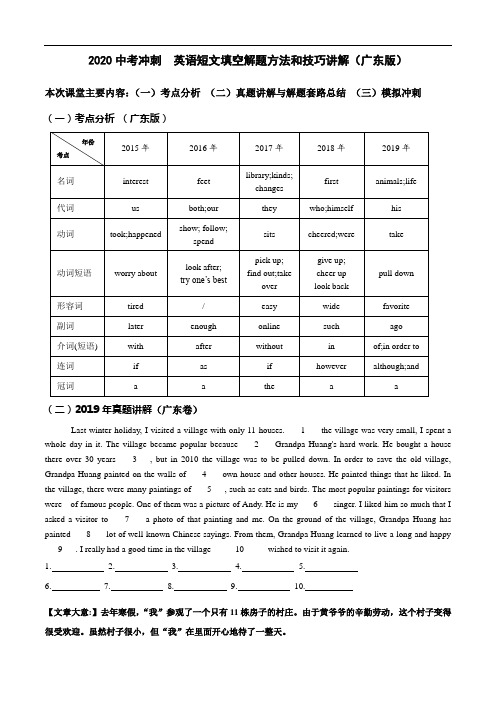
2020中考冲刺英语短文填空解题方法和技巧讲解(广东版)本次课堂主要内容:(一)考点分析(二)真题讲解与解题套路总结(三)模拟冲刺(一)考点分析(广东版)(二)2019年真题讲解(广东卷)Last winter holiday, I visited a village with only 11 houses. ___1___ the village was very small, I spent a whole day in it. The village became popular because ___2___ Grandpa Huang's hard work. He bought a house there over 30 years ___3___, but in 2010 the village was to be pulled down. In order to save the old village, Grandpa Huang painted on the walls of ___4___ own house and other houses. He painted things that he liked. In the village, there were many paintings of ___5___, such as cats and birds. The most popular paintings for visitors were of famous people. One of them was a picture of Andy. He is my ___6___ singer. I liked him so much that I asked a visitor to ___7___ a photo of that painting and me. On the ground of the village, Grandpa Huang has painted ___8___ lot of well-known Chinese sayings. From them, Grandpa Huang learned to live a long and happy ___9___. I really had a good time in the village _____10_____ wished to visit it again.1. 2. 3. 4. 5.6. 7. 8. 9. 10.【文章大意:】去年寒假,“我”参观了一个只有11栋房子的村庄。
2020广东省中考——英语完形填空题型解题方法和技巧讲解(附练习试题)
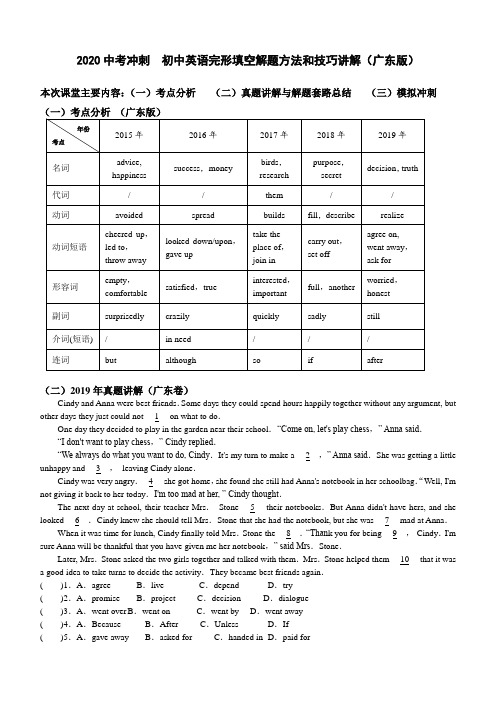
2020中考冲刺初中英语完形填空解题方法和技巧讲解(广东版)本次课堂主要内容:(一)考点分析(二)真题讲解与解题套路总结(三)模拟冲刺(二)2019年真题讲解(广东卷)Cindy and Anna were best friends.Some days they could spend hours happily together without any argument, but other days they just could not __1__ on what to do.One day they decided to play in the garden near their school.“Come on, let's play chess,” Anna said.“I don't want to play chess,” Cindy replied.“We always do what you want to do, Cindy.It's my turn to make a __2__,” Anna said.She was getting a little unhappy and __3__,leaving Cindy alone.Cindy was very angry.__4__ she got home,she found she still had Anna's notebook in her schoolbag.“Well, I'm not giving it back to her today.I'm too mad at her, ” Cindy thought.The next day at school, their teacher Mrs.Stone __5__ their notebooks.But Anna didn't have hers, and she looked __6__.Cindy knew she should tell Mrs.Stone that she had the notebook, but she was __7__ mad at Anna.When it was time for lunch, Cindy finally told Mrs.Stone the __8__.“Than k you for being __9__,Cindy.I'm sure Anna will be thankful that you have given me her notebook,” said Mrs.Stone.Later, Mrs.Stone asked the two girls together and talked with them.Mrs.Stone helped them __10__ that it was a good idea to take turns to decide the activity.They became best friends again.()1.A.agree B.live C.depend D.try()2.A.promise B.project C.decision D.dialogue()3.A.went over B.went on C.went by D.went away()4.A.Because B.After C.Unless D.If()6.A.worried B.normal C.proud D.relaxed()7.A.still B.never C.usually D.almost()8.A.chance B.method C.truth D.rule()9.A.patient B.honest C.active D.quiet()10.A.describe B.explain C.guess D.realize【文章大意】这是一篇记叙文,主要叙述Cindy与Anna两位好朋友经常就一些事情争吵,一位老师通过教导使她们意识到轮流做决定是一个好主意,她们再次成为好朋友的故事。
2020广东省中考——英语完形填空题型解题方法和技巧讲解(附练习试题)

2020中考冲刺初中英语完形填空解题方法和技巧讲解(广东版)本次课堂主要内容:(一)考点分析(二)真题讲解与解题套路总结(三)模拟冲刺(二)2019年真题讲解(广东卷)Cindy and Anna were best friends.Some days they could spend hours happily together without any argument, but other days they just could not __1__ on what to do.One day they decided to play in the garden near their school.“Come on, let's play chess,” Anna said.“I don't want to play chess,” Cindy replied.“We always do what you want to do, Cindy.It's my turn to make a __2__,” Anna said.She was getting a little unhappy and __3__,leaving Cindy alone.Cindy was very angry.__4__ she got home,she found she still had Anna's notebook in her schoolbag.“Well, I'm not giving it back to her today.I'm too mad at her, ” Cindy thought.The next day at school, their teacher Mrs.Stone __5__ their notebooks.But Anna didn't have hers, and she looked __6__.Cindy knew she should tell Mrs.Stone that she had the notebook, but she was __7__ mad at Anna.When it was time for lunch, Cindy finally told Mrs.Stone the __8__.“Than k you for being __9__,Cindy.I'm sure Anna will be thankful that you have given me her notebook,” said Mrs.Stone.Later, Mrs.Stone asked the two girls together and talked with them.Mrs.Stone helped them __10__ that it was a good idea to take turns to decide the activity.They became best friends again.()1.A.agree B.live C.depend D.try()2.A.promise B.project C.decision D.dialogue()3.A.went over B.went on C.went by D.went away()4.A.Because B.After C.Unless D.If()6.A.worried B.normal C.proud D.relaxed()7.A.still B.never C.usually D.almost()8.A.chance B.method C.truth D.rule()9.A.patient B.honest C.active D.quiet()10.A.describe B.explain C.guess D.realize【文章大意】这是一篇记叙文,主要叙述Cindy与Anna两位好朋友经常就一些事情争吵,一位老师通过教导使她们意识到轮流做决定是一个好主意,她们再次成为好朋友的故事。
中考英语完形填空解题技巧附例题讲解

中考英语完形填空解题技巧附例题讲解一、完形填空解题技巧:1. 通读全文,领会大意完形填空题不同于单项选择填空题。
单项填空题所给的是一个或两个句子,根据本句或前后句就可以判定所选的答案。
而完形填空题所给的是一篇意思完整的短文,所选的答案处在整段或整篇*之中。
所以在做题前,必须先浏览全文,了解短文的大意,这是绝不可省的一步。
每篇短文总有一定的主题思想,段落之间必然承上启下,前呼后应,句与句之间也一定紧密相连,形成一个整体。
因此通读全文是要一气呵成,不要中断思路,只要能了解短文的大意就可。
某些细节不理解可以跳过。
如果不影响答题,可以置之不理。
切不可把宝贵的时间浪费在个别字句推敲上。
如果与答题有关,可到第二步填空时再琢磨解决。
另外,在阅读时要特别注意一篇*的开头和结尾,因为它们能提供主要的信息,帮助了解全文所描述的事件或*的中心议题。
完形填空实际上是一种障碍性阅读理解题。
因此,在解题之前,先要把*通读一遍,弄清*的体裁,*体裁通常分为四种:论述文、记叙文、说明文和应用文。
中考选文以叙事性*为主,如:幽默故事、科普知识、童话、简短新闻、名人轶事、社会热点问题等。
读这类*,要大体上了解故事所涉及的时间、地点、人物、事件及前因后果,对*有个全面的了解,弄清其中心思想和大意。
然后对留空的句子进行分析,看他在该句所处的位置和作用,再从所给的选项中找出要填写什么词。
2. 紧扣内容,分析对比备选答案完形填空所用的短文一般不给标题,但短文的主题句,往往在每段*的首句,有时也出现在*的中间或结束处。
主题句提供全篇的性质、大意等,这是深入了解全文的“窗口”,甚至能以语句为立足点,从该句的时态、语气推测全文的主要内容。
分析时应注意以下几点:(1) 当遇到一个需要填的词时,首先要考虑这个词在句子中的成分是什么?词性是什么?(2) 如果需要填的是名词,就要考虑名词的单复数和所有格形式。
(3) 如果需要填的是形容词或副词,就应考虑是用原级或是比较级,还是最高级。
广东中考完型填空解题技巧与方法
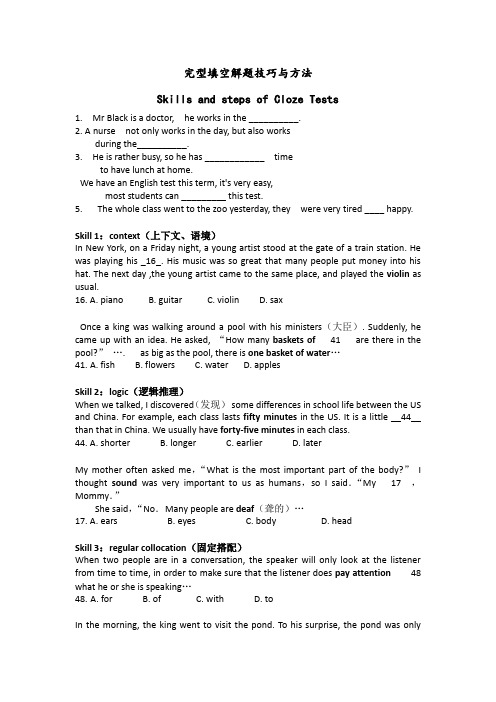
完型填空解题技巧与方法Skills and steps of Cloze Tests1. Mr Black is a doctor, he works in the __________.2. A nurse not only works in the day, but also worksduring the__________.3. He is rather busy, so he has ____________ timeto have lunch at home.We have an English test this term, it's very easy,most students can _________ this test.5. The whole class went to the zoo yesterday, they were very tired ____ happy. Skill 1:context(上下文、语境)In New York, on a Friday night, a young artist stood at the gate of a train station. He was playing his _16_. His music was so great that many people put money into his hat. The next day ,the young artist came to the same place, and played the violin as usual.16. A. piano B. guitar C. violin D. saxOnce a king was walking around a pool with his ministers(大臣). Suddenly, he came up with an idea. He asked, “How many baskets of41 are there in the pool?”…. as big as the pool, there is one basket of water…41. A. fish B. flowers C. water D. applesSkill 2:logic(逻辑推理)When we talked, I discovered(发现)some differences in school life between the US and China. For example, each class lasts fifty minutes in the US. It is a little __44__ than that in China. We usually have forty-five minutes in each class.44. A. shorter B. longer C. earlier D. laterMy mother often asked me,“What is the most important part of the body?”I thought sound was very important to us as humans,so I said.“My 17 ,Mommy.”She said,“No.Many people are deaf(聋的)…17. A. ears B. eyes C. body D. headSkill 3:regular collocation(固定搭配)When two people are in a conversation, the speaker will only look at the listener from time to time, in order to make sure that the listener does pay attention 48 what he or she is speaking…48.A. for B. of C. with D. toIn the morning, the king went to visit the pond. To his surprise, the pond was onlyfilled with water! What happened? Yes! Everyone had the same idea 48 that man.48. A. with B. to C. as D. ofSkill 4:grammar analysis(语法分析)As a reporter, I think I will meet lots of people and I should be friendly to them. I think I'll also make many good 25 and live with them, because I don't like living alone.25. A. friend B. friends C. friends’ D. friends’Skill 5:background knowledge(背景知识)All over the world people swim for fun. Swimming is enjoyed by people of 32 ages, from the very young to the very old. There are many places for people to swim in swimming pools.32.A. all B. none C. some D. bothToday, I am very happy to have a meeting with you. At the meeting we will talk about the _31_ we have these days. We all know the problems of _32_ and the objects falling from windows are getting worse. We have _33_ lots of letters about such problems. So_34_ is time for possible ways to work out these problems.31.A. lessons B. problems C. classes D. films32.A. Dogs B. birds C.cats D. snakes33.A. Made B.opened C recieved D. invented34.A. That B. it C . this D. hereSome dog-owners don't_35_ their dogs well enough, and they let their dogs make mess on the roads and in gardens. This makes the environment _36_. I would like to tell the dog-owners _37_ their behavior is too bad, and at the same time they are_38_ people feel unhappy. We should keep the environment _39_.35.A. take care of B. take away C. take off D. take out36.A. Noisy B. quiet C. tidy D.dirty37.A. What B. that C. where D. when38.A.stopping B. helping C. telling D. making39.A. Pleasant B.important eful D.famousIt is reported that some people_40_ rubbish out of the windows. It is dangerous because falling objects _41_hurt others. It is against the law. We should put up a notice to teach people not to do so. If it is found, we will record the_42_ and address of those people who throw objects. Then, a warning will be given and_43_ will bepunished by law.40.A. Pull B. put C. throw D. take41.A. May B. need C. have to D. should42.A. Jobs B.ages C.hobbies D. names43.A. We B. you C. they D. heA safe and comfortable living environment is important to us. _44_ we try our best to care for our community, it will be a good place to_45_ in. Thank you for your coming.44.A. If B. Because C. Before D.Unless45.A. Study B.live C.work D. teach。
广州市中考英语各题型做题技巧
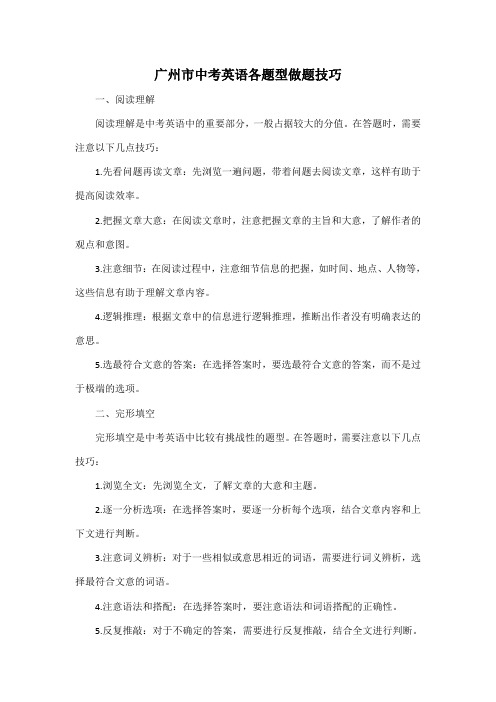
广州市中考英语各题型做题技巧一、阅读理解阅读理解是中考英语中的重要部分,一般占据较大的分值。
在答题时,需要注意以下几点技巧:1.先看问题再读文章:先浏览一遍问题,带着问题去阅读文章,这样有助于提高阅读效率。
2.把握文章大意:在阅读文章时,注意把握文章的主旨和大意,了解作者的观点和意图。
3.注意细节:在阅读过程中,注意细节信息的把握,如时间、地点、人物等,这些信息有助于理解文章内容。
4.逻辑推理:根据文章中的信息进行逻辑推理,推断出作者没有明确表达的意思。
5.选最符合文意的答案:在选择答案时,要选最符合文意的答案,而不是过于极端的选项。
二、完形填空完形填空是中考英语中比较有挑战性的题型。
在答题时,需要注意以下几点技巧:1.浏览全文:先浏览全文,了解文章的大意和主题。
2.逐一分析选项:在选择答案时,要逐一分析每个选项,结合文章内容和上下文进行判断。
3.注意词义辨析:对于一些相似或意思相近的词语,需要进行词义辨析,选择最符合文意的词语。
4.注意语法和搭配:在选择答案时,要注意语法和词语搭配的正确性。
5.反复推敲:对于不确定的答案,需要进行反复推敲,结合全文进行判断。
三、语法选择语法选择题主要考察学生对英语语法的掌握程度。
在答题时,需要注意以下几点技巧:1.分析句子结构:先分析句子结构,了解句子的主语、谓语、宾语等成分,这样可以更好地判断语法是否正确。
2.注意时态和语态:在选择答案时,要注意时态和语态的正确性,确保与句子的语境相符。
3.注意词语搭配:对于一些固定搭配的词语,需要熟练掌握,避免出现搭配错误。
4.注意语法规则:对于一些复杂的语法规则,需要仔细理解和掌握,避免出现理解偏差。
5.选最符合语法的答案:在选择答案时,要选最符合语法的答案,避免选择过于勉强的选项。
四、写作写作是中考英语中比较重要的一部分,主要考察学生的语言表达能力和思维逻辑能力。
在答题时,需要注意以下几点技巧:1.审题:先仔细审题,明确写作要求和要点,避免出现跑题或遗漏的情况。
广东中考英语总复习——完形填空

4.根据上下文的逻辑关系确定选项。 有时,选项中所给的四个词为表示上下文逻辑关系的连 接性词语,它涉及文章的起承转合、上下连贯。这类题主 要考查考生对上下文逻辑关系的理解,如转折关系、让步 关系、因果关系、递进关系、增补关系、比较关系,以及 对比关系等。 5.根据生活常识以及相关知识确定选项。
真题分析 (2018·广东) 完形填空(本大题有10小题, 每小题1分, 共 10分) 通读下面短文,掌握其大意,然后在每小题所给的四个 选项中,选出一个最佳答案,并将答题卡上对应题目所选 的选项涂黑。
C . luckily
D.excitedly
【语篇解读】 本文是一篇记叙文,叙述了一位智者让一个孩子去河边 打水,让孩子在打水过程中了解到在完成手上目标的同时, 也不该忘记欣赏人生路上的风景,二者皆不可失的道理。 文章立意较为深刻,贴近生活,具有教育意义。
【答案详解】 46 . C 考 查 名 词 辨 析 。 research 调 查 ; promise 承 诺 ; purpose目的;experience经历。根据上下文意思,可知选C。 句意:当老人家了解了他的目的后,他递给男孩一个空碗。
The boy could say nothing about them because he gave his __51__ attention to the bowl in his hands.
The old man smiled and said, “Bring me __52__ bowl of water, but this time enjoy the flowers and the singing of birds as well.”
( D )51.A.public B.weak C.quick
广东中考英语完型填空试题分析
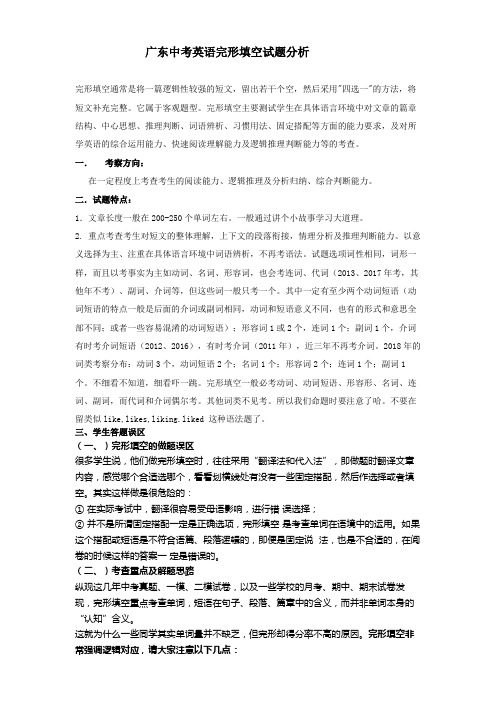
广东中考英语完形填空试题分析完形填空通常是将一篇逻辑性较强的短文,留出若干个空,然后采用"四选一"的方法,将短文补充完整。
它属于客观题型。
完形填空主要测试学生在具体语言环境中对文章的篇章结构、中心思想、推理判断、词语辨析、习惯用法、固定搭配等方面的能力要求,及对所学英语的综合运用能力、快速阅读理解能力及逻辑推理判断能力等的考查。
一.考察方向:在一定程度上考查考生的阅读能力、逻辑推理及分析归纳、综合判断能力。
二.试题特点:1.文章长度一般在200-250个单词左右。
一般通过讲个小故事学习大道理。
2. 重点考查考生对短文的整体理解,上下文的段落衔接,情理分析及推理判断能力。
以意义选择为主、注重在具体语言环境中词语辨析,不再考语法。
试题选项词性相同,词形一样,而且以考事实为主如动词、名词、形容词,也会考连词、代词(2013、2017年考,其他年不考)、副词、介词等,但这些词一般只考一个。
其中一定有至少两个动词短语(动词短语的特点一般是后面的介词或副词相同,动词和短语意义不同,也有的形式和意思全部不同;或者一些容易混淆的动词短语);形容词1或2个,连词1个;副词1个,介词有时考介词短语(2012、2016),有时考介词(2011年),近三年不再考介词。
2018年的词类考察分布:动词3个,动词短语2个;名词1个;形容词2个;连词1个;副词1个。
不细看不知道,细看吓一跳。
完形填空一般必考动词、动词短语、形容形、名词、连词、副词,而代词和介词偶尔考。
其他词类不见考。
所以我们命题时要注意了哈。
不要在留类似like,likes,liking.liked 这种语法题了。
三、学生答题误区(一、)完形填空的做题误区很多学生说,他们做完形填空时,往往采用“翻译法和代入法”,即做题时翻译文章内容,感觉哪个合适选哪个,看看划横线处有没有一些固定搭配,然后作选择或者填空。
其实这样做是很危险的:①在实际考试中,翻译很容易受母语影响,进行错误选择;②并不是所谓固定搭配一定是正确选项,完形填空是考查单词在语境中的运用。
广东英语完型填空解题技巧
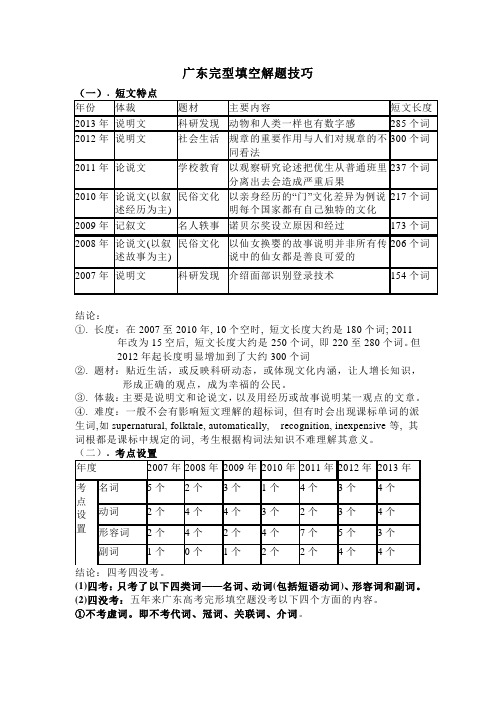
广东完型填空解题技巧结论:①. 长度:在2007至2010年, 10个空时, 短文长度大约是180个词; 2011年改为15空后, 短文长度大约是250个词, 即220至280个词。
但2012年起长度明显增加到了大约300个词②. 题材:贴近生活,或反映科研动态,或体现文化内涵,让人增长知识,形成正确的观点,成为幸福的公民。
③. 体裁:主要是说明文和论说文,以及用经历或故事说明某一观点的文章。
④. 难度:一般不会有影响短文理解的超标词, 但有时会出现课标单词的派生词,如supernatural, folktale, automatically, recognition, inexpensive等, 其词根都是课标中规定的词, 考生根据构词法知识不难理解其意义。
结论:四考四没考。
(1)四考:只考了以下四类词——名词、动词(包括短语动词)、形容词和副词。
(2)四没考:五年来广东高考完形填空题没考以下四个方面的内容。
①不考虚词。
即不考代词、冠词、关联词、介词。
②不考语法。
试题答案全都是通过理解语篇意义, 根据上下文的逻辑关系来确定。
③不考固定搭配。
只需记熟固定搭配, 无需理解语篇意义即可选出答案的题一般不考。
④不考同义词辨析。
五年来, 从来没有将在具体语境中其词义或用法难以辨别的两个或几个词语作为同一个小题的选项。
一般说来, 四个选项的意义, 差别较大。
(三)解题方法:1. 四个步骤(1)通读全文,理解大意。
重视首句信息,跳过空格,浏览全文,正确理解短文的主旨大意,了解短文主要的时间、地点、人物、事件、原因、结果等以及变化,了解短文行文的上下文之间的逻辑思维关系等,为下一步解题作好充分准备。
从整体上感知全文,理解文章大意,这是解题的基础。
(2)瞻前顾后,避难就易。
在理解文章大意的情况下,结合各选项的意义和用法,遵循先易后难的原则,先解决那些自己有把握的问题。
对少数难题,暂时跳过,或许在上文中难以判断的题在下文中就有暗示或者明显的提示,或许一个在前面不能解的题在填出了另一空后会令你豁然开朗。
专题3.完形填空-中考英语真题分类精解与解题技巧(广东专用)
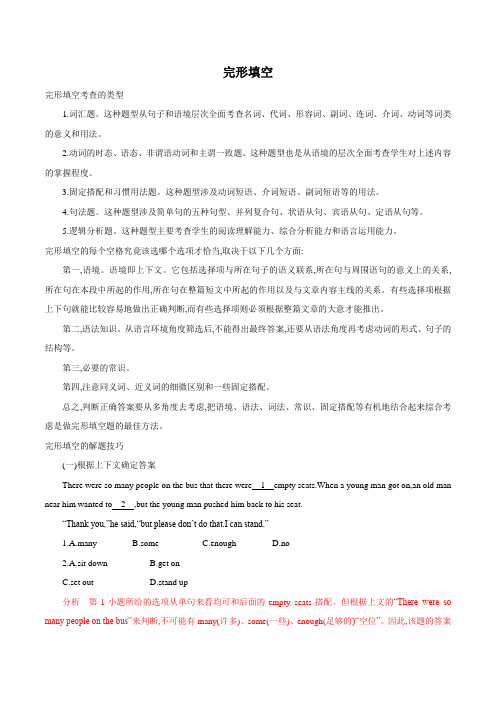
完形填空完形填空考查的类型1.词汇题。
这种题型从句子和语境层次全面考查名词、代词、形容词、副词、连词、介词、动词等词类的意义和用法。
2.动词的时态、语态、非谓语动词和主谓一致题。
这种题型也是从语境的层次全面考查学生对上述内容的掌握程度。
3.固定搭配和习惯用法题。
这种题型涉及动词短语、介词短语、副词短语等的用法。
4.句法题。
这种题型涉及简单句的五种句型、并列复合句、状语从句、宾语从句、定语从句等。
5.逻辑分析题。
这种题型主要考查学生的阅读理解能力、综合分析能力和语言运用能力。
完形填空的每个空格究竟该选哪个选项才恰当,取决于以下几个方面:第一,语境。
语境即上下文。
它包括选择项与所在句子的语义联系,所在句与周围语句的意义上的关系,所在句在本段中所起的作用,所在句在整篇短文中所起的作用以及与文章内容主线的关系。
有些选择项根据上下句就能比较容易地做出正确判断,而有些选择项则必须根据整篇文章的大意才能推出。
第二,语法知识。
从语言环境角度筛选后,不能得出最终答案,还要从语法角度再考虑动词的形式、句子的结构等。
第三,必要的常识。
第四,注意同义词、近义词的细微区别和一些固定搭配。
总之,判断正确答案要从多角度去考虑,把语境、语法、词法、常识、固定搭配等有机地结合起来综合考虑是做完形填空题的最佳方法。
完形填空的解题技巧(一)根据上下文确定答案There were so many people on the bus that there were1empty seats.When a young man got on,an old man near him wanted to2,but the young man pushed him back to his seat.“Thank you,”he said,“but please don’t do that.I can stand.”1.A.many B.some C.enough D.no2.A.sit down B.get onC.set outD.stand up分析第1小题所给的选项从单句来看均可和后面的empty seats搭配。
广州中考英语解题要点总结讲解之语法选择和完型填空
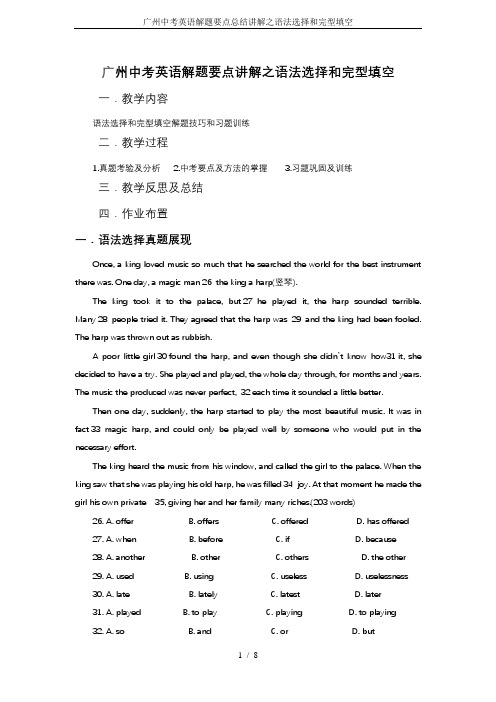
广州中考英语解题要点讲解之语法选择和完型填空一.教学内容语法选择和完型填空解题技巧和习题训练二.教学过程1.真题考验及分析2.中考要点及方法的掌握3.习题巩固及训练三.教学反思及总结四.作业布置一.语法选择真题展现Once, a king loved music so much that he searched the world for the best instrument there was. One day, a magic man26the king a harp(竖琴).The king took it to the palace, but27he played it, the harp sounded terrible. Many28people tried it. They agreed that the harp was29and the king had been fooled. The harp was thrown out as rubbish.A poor little girl30found the harp, and even though she didn’t know how31it, she decided to have a try. She played and played, the whole day through, for months and years. The music the produced was never perfect,32each time it sounded a little better.Then one day, suddenly, the harp started to play the most beautiful music. It was in fact33magic harp, and could only be played well by someone who would put in the necessary effort.The king heard the music from his window, and called the girl to the palace. When the king saw that she was playing his old harp, he was filled34joy. At that moment he made the girl his own private35, giving her and her family many riches.(203 words)26. A. offer B. offers C. offered D. has offered27. A. when B. before C. if D. because28. A. another B. other C. others D. the other29. A. used B. using C. useless D. uselessness30. A. late B. lately C. latest D. later31. A. played B. to play C. playing D. to playing32. A. so B. and C. or D. but33. A. a B. an C. the D. /34. A. in B. of C. by D. with35. A. music B. musical C. musician D. Musically 二.语法选择解题方法(1)、语法选择的特点本题型一般为200词左右的叙述短文,在篇章中考查基本语法,第一句话往往是完整的,一般不设空。
- 1、下载文档前请自行甄别文档内容的完整性,平台不提供额外的编辑、内容补充、找答案等附加服务。
- 2、"仅部分预览"的文档,不可在线预览部分如存在完整性等问题,可反馈申请退款(可完整预览的文档不适用该条件!)。
- 3、如文档侵犯您的权益,请联系客服反馈,我们会尽快为您处理(人工客服工作时间:9:00-18:30)。
XX中考英语完形填空解题技巧与专项训练“完形填空”是初中英语试题中固定而重要的题型。
它是一种障碍性的测试题。
在一定程度上考查考生的阅读能力、逻辑推理及分析归纳、综合判断能力。
这种题型归纳起来有如下特点:1.在整份试卷中所占的分值较重,占10—15%,长度一般在130—200个单词左右。
2.降低了对单词本身的考查要求,重点考查考生对短文的整体理解,上下文的段落衔接,情理分析及推理判断能力。
3.针对初中学生的实际水平,一般采用故事体,尽量避免专业性太强的文章或论文体。
近年来出现了以意义选择为主、语法选择逐渐减少的趋势。
“完形填空”有多种形式,但它在基本设计原则上都是一致的。
形式都是从短文中抽去若干词,让考生根据上下文填入适当的词,为了有助于考生填入适当的词,可以提供四个答案(其中包括一个正确答案),让考生选出正确的答案;也可以给出单词首字母完形填空,或者给出字母及单词长度(由几个字母组成);也可以不给考生提供任何线索,完全凭借考生对文章的理解和现有的语言能力完成。
最常见的还是选择型的“完形填空”。
“抽词法”可以是有针对性地抽,也可以是随机地抽。
但目前比较流行的是对文章理解能力的考查,而不是单纯对语法结构的考查。
“完形填空”要求考生不仅要会运用自己学过的词汇和语法知识妥善地处理好每个单句,理解语义,还要处理好单句之间以及单句与全文之间的内在关系,选出适当的词填上,使文章完整与通顺。
完形填空题要求填入的词主要有:构成各种时态和用法区别的动词及短语动词;名词和介词;根据上下文意思及结构必须填入的形容词、副词、代词和连词;同义词、近义词等易混词。
考查以实词为主,兼顾虚词和语法结构。
难点主要集中在根据上下文作正确判断的词的用法上。
“完形填空”旨在测试考生的综合应用语言能力。
因此,要做好“完形填空”,不仅要具备一定的词法、句法和惯用法等语法知识,而且还要具备阅读理解能力、综合分析能力和运用语言知识的实践能力。
完形填空通常是将一篇逻辑性较强的短文,留出若干个空,然后采用"四选一"的方法,将短文补充完整。
它属于客观题型。
如今的完形填空题除保留传统题型的优点外,还采用了选词填空(有多余选项)或根据上下文补全对话(或短文)等主观题型。
但事实证明,完形填空通常是同学们较难把握的题型之一,且失分率较高。
限于篇幅,本文着重谈谈客观题型的解法。
请看--一、目标要求完形填空主要测试学生在具体语言环境中对文章的篇章结构、中心思想、推理判断、词语辨析、习惯用法、固定搭配等方面的能力要求,及对所学英语的综合运用能力、快速阅读理解能力及逻辑推理判断能力等。
二、解题步骤在做完形填空题时,通常先弄清语境,并依据上下文进行合理的分析、判断,才能作出恰当的选择。
具体可分为以下三步:1. 通览全文,了解大意答题时,应先越过空档,通读全文,理顺题意,找出信息词。
这是做好完形填空题的关键。
因为完形填空的特点是着眼于整体理解。
我们如果把短文比作环环相扣的链条,那么由于空格的设置,"链条"从第二句起有些地方就脱节了。
有些同学习惯于提笔就填或边读边填,急于求成,然而,欲速则不达,结果往往由于"只见树木不见森林"而事倍功半。
因此我们应该依据首句给的启示,通过逻辑思维,借助短文中关键词所提供的信息,越过空档,尽快把全文读完,建立语言的整体感,帮助我们了解短文大意。
2. 综合考虑,先易后难通览全文后,认真观察选项,瞻前顾后,仔细推敲,逐项选定。
经过通读全文,对短文有了整体印象。
在此基础上,可以根据全文大意,展开逻辑思维,分析这一空格处在句中的地位,前后的关系和它所起的作用,确定最佳答案。
遇到困难,暂放一边,先易后难,这是解题之道。
当遇到难以判断的空档时,不妨先放一边,继续往下做。
因为有些答案是必须通过下文的理解后才能作出断定的。
有时,前后信息之间还有相互提示作用。
因此,当我们遇到难题时,不能久久停留于此,这样会浪费不必要的时间。
3. 复读检验,消除疏漏完成所有空档后,还要再次通读全文,看看这时的短文行文是否流畅,意义是否连贯,逻辑关系是否合理。
复查时,可从语法入手,检查一下句子的时态、主谓一致、代词的性、数、格以及词语的搭配等是否正确。
凡遇疑点,必须根据文章的中心思想,从意义、语法的角度来仔细权衡,加以改正,弥补疏漏。
三、实例点拨请根据下面短文内容,在短文后面的四个选项中选择一个能填入空白处的最佳答案。
Every year students in many countries learn English. Some of these students are children, __1__ students are young people. Why do all these people want to learn__2__? It is not__3__to answer this question. Many boys and girls learn English at school. It is one of their __4__. Many people learn English because it is__5__in their work. Some young people learn English__6__their higher studies because some of their books are__7__English. Other people learn English because they want to __8__newspapers in English. Some people learn English because they want to __9__ in the USA, England or Australia. English is very__10__in our life (生活).1. A. all B. the other C. both D. other2. A. English B. Chinese C. maths D. Japanese3. A. hard B. easy C. good D. nice4. A. books B. classes C. schools D. subjects (科目)5. A. good B. useful (有用的) C. fine D. pleased6. A. for B. of C. to D. from7. A. in B. with C. at D. of8. A. look B. see C. look at D. read9. A. go B. work C. like D. e10. A. help B. helping C. helps D. helpful答题分三步:第一步:通览全文通过通览全文,便知本文讲述许多人学习英语。
学习英语的人年龄不同,目的各异。
第二步:逐项填空本着先易后难的原则,先根据上下文和自己的语感,推测部分空格的可能答案。
然后,再结合选项逐一敲定。
1. 选B。
some...other(s)...意思是"一些……另一些(泛指)";some...the other(s)...意思是"一些……另一些(特指)"。
由语境可知,在学英语的学生中,除一部分是孩子外,剩余的是青年人(特指)。
2. 选A。
根据上下文可知是English。
3. 选B。
由文章内容来看,人们学习英语的原因多种多样,因此回答为什么那么多人学习英语这个问题并不容易。
4. 选D。
由常识可知,English是学生学习的科目(subject)之一。
5. 选B。
根据前后文意可知许多人学习英语,那是因为English在他们的工作中很有用(useful)。
6. 选A。
本题属于介词用法辨析。
介词for在此可表示目的、原因。
7. 选A。
in English是习惯搭配。
8. 选D。
"读报"英语习惯说read newspapers。
9. 选B。
根据语境及句子结构,有些人学习英语或想出国(go to a country)或想在这些国家工作(work in a country)。
10. 选D。
末句点题,"英语在我们生活中是很有帮助的(helpful)"。
第三步:复读检验将所有答案代入空格后,重新将短文复读一遍,如果语句通顺,语意清楚,便结束本题,转做其它试题。
最后须提醒大家一点,做好完形填空题并非一日之功。
我们应从平日学习中做起,多积累,勤学苦练,方可成功!Have a greater success in the future!(1)Alice had an argument with her best friend, Judy last Thursday. She thought 41 was really difficult and wanted to copy Judy’s homework. But she refused. They didn’t talk to each other for a few days. Alice didn’t know 42 to face her maths problem and she wondered if she could get on well with her friend again.Yesterday afternoon, she saw a cool boy 43 the violin happily by the road when she was walking home from school. The violin music sounded so nice that she couldn’t help stopping to listen to him. 44 Alice didn’t know what music he was playing, it made her feel better. After he finished the music, Alice walked over to him and said, “Thank you 45 your beautiful music. It gets me out of the really bad mood(心情).” Then she took out some 46 and gave it to him. To her surprise, the boy asked her to take the money back. He explained that he wasn’t making money by playing the violin. He just wanted to 47 others. He hoped that the wonderful music could make people relaxed and happy. That’s why he played it by the road. What a 48 boy he was! Then Alice told him about her trouble.He said, “You should learn to smile even if you are in difficulty. Listening to music is helpful. So why not listen to music as 49 as possible? Never lose heart! Believe in your friend! She has her reason. Believe in 50 ! Everything will go well!Hearing these words, Alice went home with a smile. She believed she could make it.( ) 41. A. Chinese B. maths C. science D. physics( ) 42. A. why B. how C. when D. where( ) 43. A. carrying B. selling C. buying D. playing( ) 44. A. Because B. When C. Though D. Whether( ) 45. A. for B. with C. from D. except( ) 46. A. music B. money C. food D. work( ) 47. A. have B. leave C. give D. help( ) 48. A. tall B. rich C. kind D. safe( ) 49. A. often B. quickly C. soon D. loudly( ) 50. A. myself B. herself C. yourself D. himself(2)These days, some middle schools in China are trying to do something different.The students choose classes according to their own needs. For each subject, they can make a choice from different levels (等级) of difficulty. So instead of staying in the41classroom, they go to different rooms to have their lessons. And the teachers make special teaching plans for42. There are different opinions about it.Xia Rui, a 13-year-old girl, said, “I really love it. I think it’s nice that we can43classes by ourselves. My English is poor. I used to be afraid to answer questions in class. I think that the good students may44me when I make mistakes. Now I feel much more relaxed.”But her classmate Chen Gang didn’t agree. “I don’t think it is so good45it is difficult for students to find where the classrooms are,”he said. “During the break, students can be seen here and there, running and shouting to find their46.”“I’m worried that some students may think they are in the lower class47lose interested in the subject,”their math teacher, Mr. Wang said. “I also48that some parents may feel unhappy if their kids study a subject at an easy level.”“In my eyes, it is good49both students and teachers,’Mr. Wang also said. “As teachers, we can make teaching plans more50and the students will develop better.”41. A. clean B. same C. bright D. empty42. A. us B. him C. them D. you43. A. play B. teach C. choose D. work44. A. laugh at B. listen to C. look after D. wait for45. A. whether B. because C. when D. before46. A. parents B. friends C. books D. classrooms47. A. and B. but C. till D. or48. A. hope B. report C. cry D. worry49. A. for B. at C. on D. with50. A. slowly B. easily C. quietly D. brightly(3)The population problem may be the1one of the world today.The world's population is growing 2.Two thousand years ago, there were only 250 million people 3the earth.Four hundred years ago, the number was 4500 million.But at the beginning of the 5century, the world's population was about 1,700 million.In 1970, this number was 3,600 million.In 1990, the number was five billion.A 6report says that the world population will 7six billion by the end of the 20th century.This is just ten 8after it 9five billion.People say that by the year 2010,10may be seven billion.1.A.great B.greater C.greatest D.greating2.A.faster and faster B.fast and fastC.fastest and fastest D.faster and fast3.A.in B.on C.at D.for4.A.nearly B.more C.almost D.over5.A.twenty B.twelve C.twentieth D.twelfth6.A.USA B.UN C.PRC D.PLA7.A.past B.pass C.passed D.passes8.A.weeks B.months C.seasons D.years9.A.get B.gets C.reached D.reach10.A.this B.its C.one D.it(4)Fire can help people in many ways. But it can also be very harmful (有害的). Fire can keep your house __1__, give light and cook food. But fire can burn things __2__. Big fire can burn, trees, houses, animals or people.Nobody knows how people began to use fire. But there are __3__. interesting old stories about how a man or woman started a fire. One is __4__ a man. The man __5__ a very long time ago. He went up the sun and __6__ fire down.Today people know how to make a fire with matches(火柴). Children sometimes__7__ to play with them. But matches can be very dangerous. One match can burn a piece of paper. and __8__ it could burn a house. A small fire can turn a big fire. very quickly. So you __9__ be careful with matches.Be careful with fire, and it will __10__ you. But if you aren’t careful with fire. and it may hurt you.1. A. warm B. warmer C. cool D. cooler2. A. also B. too C. either D. neither3. A. many B. much C. little D. no4. A. over B. about C. a little D. no5. A. worked B. studied C. learned D. lived6. A. bring B. take C. brought D. took7. A. enjoy B. like C. don't like D. bee8. A. after B. late C. yet D. then9. A. can B. man C. will D. must10. A. help B. do C. tell D. hope(5)Every day some people are killed while they are crossing the roads.1 of these people are old people and children.Old people are often killed because they can't see or 2 very well.Children are killed because they are not 3 .They forget to look and listen before they 4 the roads.A car or a bus can't stop 5 .If a car is going very fast, it will travel manymetres 6 it stops.Some people don't always understand this.They think a car can stop 7 a few metres.It is difficult to 8 how fast a car is moving.The only way to cross the roads safely is to look 9 ways, right and left.Then if the roads are 10 , you can cross them.1.A.Much B.Most C.More2.A.hear B.to hear C.hearing3.A.care B.carefully C.careful4.A.across B.e C.cross5.A.fast B.quickly C.quick6.A.before B.while C.after7.A.in B.on C.at8.A.know B.look C.listen9.A.all B.each C.both10.A.full B.empty C.busy(6)Miss Zhao is one of the most popular teachers in the school.Yesterday she came into the 1 with a big smile on her face.She said to her 2 that she was 3 to see they did well in the sports meeting.But 4 was not pleased to see the classroom last Saturday not as 5 as usual.She hoped they would clean the classroom every day.Wei Hua was on 6 yesterday.She said everyone was at 7 except Lin Tao.Then she told Miss Zhao about their 8 to the Great Wall last Sunday.Luckily the weather was 9 .They played games and had a piic there.After Wei Hua 10 her talk,Miss Zhao began her lesson.1.A.shop B.classroom C.park D.office2.A.students B.teachers C.workers D.doctors3.A.angry B.sorry C.glad D.sad4.A.she B.I C.we D.he5.A.dark B.old C.large D.clean6.A.time B.duty C.foot D.top7.A.home B.noon C.night D.school8.A.visit B.music C.clock D.football9.A.bad B.fine C.rainy D.windy10.A.started B.had C.finished D.gave(7)When you wave (挥手) to a friend, you are using sign language. When you smile at someone, you mean to be 1 . When you put one finger (手指) in front of your 2 , you mean "Be quiet."Yet, people in different countries may use different sign languages.Once an Englishman was in Italy. He could speak 3 Italian. One day while he was walking in the street, he felt 4 and went into a restaurant (餐馆). When the waiter came, the Englishman 5 his mouth, put his fingers into it and took them out again and moved his lips (嘴唇). In this way, he 6 to say, "Bring me something to eat."But the waiter brought him a lot of things to 7 . First tea, then coffee, then milk, but no food. The Englishman was 8 that he was not able to tell the waiter he was hungry. He was 9 to leave the restaurant when another man came in and put his hands on his stomach (肚子). And this sign was 10 enough for the waiter. In a few minutes, the waiter brought him a large plate of bread and meat. At last the Englishman had his meal in the same way.(8)We spent a day in the country and picked a lot of flowers. Our car was full of 1inside. On the way home my wife saw a bookshelf outside a furniture (家具) shop. "Buy it," she said at once. "We'll 2 it home on the roof-rack (车顶架). I've always wanted one like that."Ten minutes __3__ we were back with the bookshelf. 1 drove slowly. Other drivers seemed more polite than usual that evening. The 4 even stopped traffic to let us through.After a rime my wife said, "There's a long line of cars 5 . Why don't they overtake (超车)?"Just at that time a police car did overtake, and two officers inside asked us to 6 their car through the busy traffic. The police car stopped at our village church(教堂). One of the officers came to me and said, "Do you need any more 7 now?" I didn't quite understand. So I said, "You've been very 8 . We live just down the road."He was looking at our things, first at the flowers, then at the bookshelf. "Well, well," he said and 9 , "It's a bookshelf you've got here! We thought it was— er, something else."My wife began to laugh. Suddenly I understood 10 the police drove here.(9)Sam had a dog, Its name was Tod. it was very helpful, but it ate too much . So he didn't like it. he wanted to __1__ Tod. He __2__ Tod and put it in a small boat . he rowed(划)the boat to the __3__ of a big river. Just as he __4__ the poor animal into the river, the boat began to go down. __5__ the man and Tod __56__ into the river.Tod was able to swim, __7__ Sam couldn't. The dog bit(•咬) the rope(绳子) and broke it . it tried its best to swim to __8__ Sam. The man was saved, so he was very thankful (感激的)to the dog, he didn't want to kill the dog __9__. From the on, he gave the dog as __10__ as it wanted.1. A. sell B. buy C. beat D. kill2. A. tied B. pulled C. pushed D. closed3. A. front B. foot C. side D. middle4. A. threw B. carried C. sent D. brought5. A. Neither B. Nor C. Each D. Both6. A. fell B. dropped C. lost D. jumped7. A. because B. though C. but D. when8. A. kill B. save C. meet D. hit9. A. no more B. any more C. no longer D. not more10. A. little B. few C. many D. much(10)There were no classes that afternoon, so Henry went to a __1__ shop near his home. The shop sold many jackets. He looked •__2__ them and at last chose a very nice one. He __3__ it on and then told the shopkeeper to put it into a __4__. At that time his friend Bruce came into the shop. They hadn't seen each other for a long time. They were so __5__ to meet again that they forgot __6__ else. Soon they were busy talking on and on happily.It was nearly six o'clock, __7__ they decided to go and have dinner together. Henry picked up the bag, and walked __8__ the door of the shop. The shopkeeper stopped them and asked Henry to pay for the __9__. Henry looked at him in surprise atfirst, but soon he remember that he hadn't paid for it. He said __10__ ,gave him the money and them left the shop with his friend.1. A. fruit B. book C. food D. clothing2. A. up B. for C. after D. at3. A. put B. tried C. got D. turned4. A. bag B. cup C. car D. pocket5. A. worried B. interested C. pleased D. anxious6. A. nobody B. anybody C. something D. everything7. A. though B. so C. because D. but8. A. towards B. through C. out of D. round9. A. dinner B. bag C. jacket D. ticket10. A. goodbye B. yes C. hello D. sorry(11)Miss Zhao is one of the most popular teachers in the school. Yesterday she came into the 1With a big smile on her face. She said to her 2 that she was 3 to see they did well in the sports meeting. But 4 was not pleased to see the classroom last Saturday not as 5 as usual. She hoped they would clean the classroom every day.Wei Hua was on 6 yesterday. She said everyone was at 7 except Lin Tao. Then she told Miss Zhao about their 8 to the Great Wall last Sunday. Luckily the weather was 9 . They played games and had a piic there. After Wei Hua 10 her talk, Miss Zhao began her lesson.1. A. shop B. classroom C. park D. office2. A. students B. teachers C. workers D. doctors3. A. angry B. sorry C. glad D. sad4. A. she B. I C. we D. he5.A.dark B. old C. large D. clean6. A. time B. duty C. foot D. to7. A. home B. noon C. night D. school8. A. visit B. music C. clock D. football9. A. bad B. fine C. rainy D. windy10. A. started B. had C. finished D. gave(12)Mr White works in an office. He liked reading in bed when he was at school. It was bad for his 1 and now he has near sight ( 近视).But he wouldn’t want 2 to know about it and he never wears a pair of glasses. It often 3 him some trouble.One winter morning he was sent to a village school on business (出差). He 4 a bus at a stop in a small town. Then he had to walk there. The road to the village wasn’t smooth (平坦). He fell over some times and it 5 his clothes dirty. 6 he got to the village. Suddenly it began to blow and it got colder. He was looking for the school while his 7 was blown off. He began to run after it but he couldn’t get it. He couldn’t understand why his hat ran into a house as if (似乎) it had 8 . And he ran into the house, 9 .A woman stopped him and shouted angrily, “10 are you running after my hen (母鸡)for?”1. A. ears B. nose C. mouth D. eyes2. A. anybody else B. nobody C. woman D. somebody3. A. follows B. takes C. brings D. carries4. A. took off B. got off C. got on D. came on5. A. let B. made C. gave D. felt6. A. At first B. At home C. At times D. At last7. A. clothes B. bag C. hat D. glasses8. A. legs B. hands C. shoes D. arms9. A. always B. also C. either D. too10. A. What B. Why C. Which D. Who(13)Once there was an old man in a town. He always forgot 1 things. So his wife al-ways had to say to him, “Don’t forget this!”One day he went on a long trip (旅行)alone. Before he 2 home, his wife said, “Now you have all these 3 . They are what you need for your trip. Take care of your things during the trip.” He went to the station, bought a ticket and 4 the train with it.About half 5 hour later, the conductor began to see the tickets. He came to the old man and 6 , “Will you please show me your ticket?” The old man looked for his ticket in all his pockets, but he could not find 7 . He was very worried. “I can’t find my ticket. I really bought a ticket 8 I got on the train,” said the old man.“I believe (相信)you bought a ticket. All right, you don’t have to buy 9 one,”said the conductor kindly. “But how can I know where I’m going? I can’t 10 my station!” the old man said sadly.1. A. a lot of B. a kind of C. a piece of D. a pair of2. A. got B. left C. went D. moved3. A. money B. clothes C. tickets D. things4. A. had on B. went on C. got on D. passed on5. A. a B. an C. the D. this6. A. say B. said C. says D. saying7. A. it B. this C. that D. ticket8. A. when B. till C. before D. after9. A. other B. the other C. the others D. another10. A. forget B. get C. remember D. see(14)Once a lion(狮子) saw a fine young horse and wanted to eat it. But the horse was very1 and he could not catch her. Then the lion had an2 . He told the3 that he wasa good 4 and could do something for them. The horse was 5 , She understood 6 the lion wanted to do.So one day when the lion was near the horse,she told him that there was 7 wrong with one of her feet and asked him to look it 8 . Of course, the lion was very glad to do so. Then the horse raised(抬起) one of his legs from the ground 9 the lion looked at her foot, she kicked him on the 60 . The lion fell to the ground. The horse laughed and ran away.1. A. beautiful B. young C. careful2. A. idea B. way C. answer3. A. friends B. animals C. birds4. A. doctor B. nurse C. teacher5. A. sad B. afraid C. clever6. A. what B. how C. where7. A. nothing B. something C. anything8. A. after B. over C. for9. A. Before B. After C. When10. A. head B. legs C. hands(15)Once there was a father and a son. They were ill-tempered (坏脾气的) and never gave way to 1 .One day the father decided to ask some friends to dinner in his house. He 2 his son to buy some meat in town. When the son got what his father wanted, he turned 3 and walked towards the town gate. Just then a man was ing from the outside. The gate wasn’t 4 enough to let two men in and out at the same time. But 5 of them would give way to the other. They 6 straight face to face inside the gate hour after hour. But the father was worried. “What shall I do? My son hasn’t 7 yet. I can’t wait any longer.” He wanted to know what was the 8 with his son. So he left his friends at home, and he himself went to town to look for his son.“You may first take the 9 home for my friends. Let me stand here against him 10 .” He said to his son when he knew what had happened.1.A. one B. another C. other D. others2.A. hoped B. told C. let D. wished3.A. down B. over C. back D. off4.A. long B. wide C. high D. narrow5.A. either B. all C. both D. neither6.A. stood B. went C. lay D. walked7.A. gone B. bought C. returned D. been8.A. wrong B. accident C. thing D. matter9.A. meat B. dinner C. bread D. money10.A politely B. instead C. safely D. kindly(16)Debbie got up early last Saturday morning. She wanted 1in Green Park with some ot her friends. She was very happy about it.2 she was ready, she got on her bike and left for the park – it was on the other side of the town. Suddenly, as she was riding fast, she3 sirens (警笛). The sound of the sirens was getting4 , so Debbie looked5 her to see what was happening. As a result (结果), she fell off her bike and lay in the middle of the road. Luckily, Debbie wasn’t hurt,6 a car hit her bike. After the car7 , two men got out and started running.8 , a police car stopped next to the same car and three policemen got out and started running after the two men. One of the policemen shouted, “Stop the thieves (贼)!”9 a policeman came to see Debbie. He thanked her because, in a way, she had helped them10 .1. A. goes to skate B. go skating C. going to skate D. to go skating2. A. While B. As soon as C. If D. As quickly as3. A. heard B. listened to C. found D. saw4. A. close and close B. closer and closer C. big and big D. bigger and bigger5. A. after B. in front of C. behind D. before6. A. because B. so C. but D. and7. A. fell over B. passed away C. turned back D. stopped8. A. A few minutes later B. Just then C. After an hour D. Very fast9. A. In a few days B. Sometimes C. Some time later D. At the same time10. A. get out of the car B. run after the two menC. catch the thievesD. shout at the thieves(17)Tom and Fred were talking about the year 2050.“What will 1 be like in the year 2050?” asked Tom.“I don’t know,” said Fred. “What do you think?”“Well, no one knows. But it is 2 to guess,”said Tom. “In the year 2050 everybody will 3 a pocket (袖珍) puter. The puter will give people the 4 to alltheir problems. We shall all have telephones in our pockets, 5 . And we’ll be able to talk to our friends all over the world. Perhaps we’ll be able to 6 them at the same time. Machines will do 7 of the work, and people will have more 8 . Perhaps they will work only two or three days a week. They will be able to fly to the moon by spaceship and spend their holidays there.”“I’m very 9 to hear that. I hope to fly to the moon. And I hope I’ll be able to live 10 ,” said Fred. “Won’t that be interesting? Just like a fish.”1. A. our home B. the traffic C. a factory D. the world2. A. pleased B. no use C. interesting D. unusual3. A. carry B. bring C. give D. send4. A. news B. ways C. things D. answers5. A. either B. again C. too D. also6. A. call B. see C. look D. listen7. A. most B. many C. lot D. every8. A. work B. duty C. holidays D. times9. A. sorry B. glad C. sure D. afraid10. A. in the sea B. on land C. on the mountain D. under the ground。
